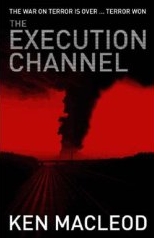Yesterday Norway officially opened what’s been called a “Noah’s ark for plant life”:
Dug deep into the permafrost of a remote Arctic mountain, the “doomsday” vault is designed by Norway to protect the world’s seeds from global catastrophe.
The Svalbard Global Seed Vault, a backup to the world’s 1,400 other seed banks, was to be officially inaugurated in a ceremony Tuesday on the northern rim of civilization attended by about 150 guests from 33 countries.
The frozen vault has the capacity to store 4.5 million seed samples from around the globe, shielding them from climate change, war, natural disasters and other threats.
For those of us that have read David Brin’s 1990 novel Earth, this sounds eerily similar to the “Arks” he used as part of the background, wildlife refuges for animal and plant species that were dying out in the wild. Brin set his novel in 2038, but reality seems impatient. Brin must’ve been particularly well inspired when he wrote Earth, as these arks are far from the first “prediction” from it that have come true, as the Wikipedia article linked to above shows. What’s more, Brin put them together into a coherent vision of the near-future that to some extent seems to be coming true. Not in all particulars of course; science fiction cannot predict the future after all.
Brin wrote his novel at a time when, like now, environmental awareness was high. Acid rain had been known since the early eighties at least, while the disappearance of the ozone layer was common knowledge at the end of the decade and was finally acted upon then, decades after it first had been discovered, while global warming and the disappearance of biodiversity were just entering public awareness. That was a time when a fair few science fiction novels, unlike now, tackled climate change.
Coincindentally there’s a recent thread on torque Control on why it is that so few sf authors currently seem unwilling or unable to tackle climate change other than as background fodder. Perhaps because most of us, other than hardcore denialists, seem convinced it is happening and it can’t be stopped only migitated. Climate change as part of the consensus future, too big to ignore but also too immediate to make writing about it fun perhaps, unlike fifteen-twenty years ago.
